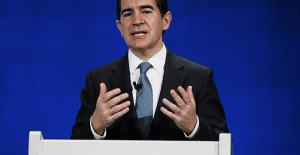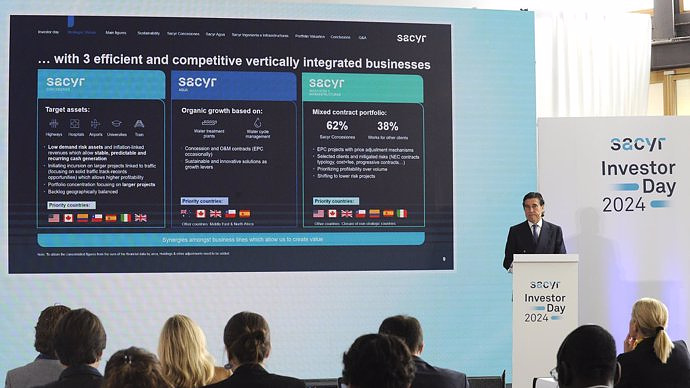MADRID, 24 Jul. (EUROPA PRESS) -
The Court of Auditors has warned of the reduced request for approved aid for maritime transport to compensate for the drop in activity as a result of the Covid-19 pandemic, with a level of requests of less than 20% in those related to the reduction of occupancy and activity rates.
This is one of the conclusions of the 'Report on the control of the application by the port authorities of the economic reactivation measures in the transport sector during the 2020 financial year and its impact on the strategic planning of the state port system'.
These measures consisted of the elimination of minimum traffic within the occupancy concessions, the reduction of the occupancy rate and the activity rate, exemptions and reductions in the vessel rate and the deferral of tax debts, among others.
As stated by the Court in its report, collected by Europa Press, the total cost of the economic reactivation measures in maritime transport amounted to 53.6 million euros, with 20.7 million corresponding to the reduction in income from the rate of occupation, 14 million to the elimination of the minimum traffic requirement, 11 million to the reduction of the activity rate and 7.8 million to the reduction of the vessel rate.
For the reduction of the occupancy rate and the activity rate, the port authorities received, respectively, 20% and 17% of requests with respect to all the existing concessions at the beginning of the declaration of the state of alarm.
A small percentage, warns the supervisory body, which explains this situation by the dependence of predominant sectors in each port, determining the volume of traffic and activity, without the effect of the pandemic being uniform in each of them.
Concessions related to port-city interaction experienced a greater impact, together with concessions related to passenger traffic, compared to industrial and logistics activities, whose activity was not particularly reduced, maintaining the level of traffic.
The concessions for industrial uses and repair and maintenance of boats, the Court points out, could not benefit from the measures because their production cycle goes beyond the financial year, so the decrease in their activity would end up being in 2021 and subsequent exercises.
The health crisis caused a drop in port traffic of 72% (63% in regular transport and 97% in cruise ships), while the contraction in freight traffic remained at 10%, this decrease being minimal, of 1% , in the transport of goods by containers (conventional goods and bulk fell by 15%).
To access the fee reduction, the applicant had to demonstrate a reduction in their activity of more than 10%, although the impact of the pandemic was not homogeneous. On the other hand, the Court states that the first regulation gave the port authorities doubts about how to apply the reduction in the occupancy rate, delaying the processing of the first applications.
Likewise, given the scant regulation of activity and occupancy rates, their application ended up being unequal between different port authorities, although each of them, internally, treated reduction requests homogeneously.
That is why the Court recommends approving a new regulation of the port system with more normative precision, including objective and uniform criteria to prevent indeterminate concepts from allowing unequal treatment between port authorities.
On the other hand, it considers it convenient that the State Ports approve guidelines applicable to the construction of new infrastructures in order to take into account the impact on projected infrastructures of the activity and the port capacity of the surrounding ports.

 Exploring Cardano: Inner Workings and Advantages of this Cryptocurrency
Exploring Cardano: Inner Workings and Advantages of this Cryptocurrency Seville.- Economy.- Innova.- STSA inaugurates its new painting and sealing hangar in San Pablo, for 18 million
Seville.- Economy.- Innova.- STSA inaugurates its new painting and sealing hangar in San Pablo, for 18 million Innova.- More than 300 volunteers join the Andalucía Compromiso Digital network in one month to facilitate access to ICT
Innova.- More than 300 volunteers join the Andalucía Compromiso Digital network in one month to facilitate access to ICT Innova.-AMP.- Ayesa acquires 51% of Sadiel, which will create new technological engineering products and expand markets
Innova.-AMP.- Ayesa acquires 51% of Sadiel, which will create new technological engineering products and expand markets Death toll rises to 107 from floods caused by heavy rains in southern Brazil
Death toll rises to 107 from floods caused by heavy rains in southern Brazil BBVA is willing to assume the possible reputational risk if the takeover bid for Sabadell does not go ahead
BBVA is willing to assume the possible reputational risk if the takeover bid for Sabadell does not go ahead Takeda earns 54% less at the end of its year and announces a restructuring plan
Takeda earns 54% less at the end of its year and announces a restructuring plan The Ibex 35 stands out from Europe and falls 0.92% affected by the collapse of BBVA after the takeover bid for Sabadell
The Ibex 35 stands out from Europe and falls 0.92% affected by the collapse of BBVA after the takeover bid for Sabadell How Blockchain in being used to shape the future
How Blockchain in being used to shape the future Not just BTC and ETH: Here Are Some More Interesting Coins Worth Focusing on
Not just BTC and ETH: Here Are Some More Interesting Coins Worth Focusing on Expociència expects to receive more than 4,000 visitors in the Science Park of the University of Valencia
Expociència expects to receive more than 4,000 visitors in the Science Park of the University of Valencia They develop devices for the precise diagnosis of cancer patients
They develop devices for the precise diagnosis of cancer patients UMH researchers are working on a high-quality apricot crop that requires less irrigation water
UMH researchers are working on a high-quality apricot crop that requires less irrigation water The UPV develops an application to improve the quality of life of patients with glioblastoma
The UPV develops an application to improve the quality of life of patients with glioblastoma A million people demonstrate in France against Macron's pension reform
A million people demonstrate in France against Macron's pension reform Russia launches several missiles against "critical infrastructure" in the city of Zaporizhia
Russia launches several missiles against "critical infrastructure" in the city of Zaporizhia A "procession" remembers the dead of the Calabria shipwreck as bodies continue to wash up on the shore
A "procession" remembers the dead of the Calabria shipwreck as bodies continue to wash up on the shore Prison sentences handed down for three prominent Hong Kong pro-democracy activists
Prison sentences handed down for three prominent Hong Kong pro-democracy activists ETH continues to leave trading platforms, Ethereum balance on exchanges lowest in 3 years
ETH continues to leave trading platforms, Ethereum balance on exchanges lowest in 3 years Investors invest $450 million in Consensys, Ethereum incubator now valued at $7 billion
Investors invest $450 million in Consensys, Ethereum incubator now valued at $7 billion Alchemy Integrates Ethereum L2 Product Starknet to Enhance Web3 Scalability at a Price 100x Lower Than L1 Fees
Alchemy Integrates Ethereum L2 Product Starknet to Enhance Web3 Scalability at a Price 100x Lower Than L1 Fees Mining Report: Bitcoin's Electricity Consumption Declines by 25% in Q1 2022
Mining Report: Bitcoin's Electricity Consumption Declines by 25% in Q1 2022 Oil-to-Bitcoin Mining Firm Crusoe Energy Systems Raised $505 Million
Oil-to-Bitcoin Mining Firm Crusoe Energy Systems Raised $505 Million Microbt reveals the latest Bitcoin mining rigs -- Machines produce up to 126 TH/s with custom 5nm chip design
Microbt reveals the latest Bitcoin mining rigs -- Machines produce up to 126 TH/s with custom 5nm chip design Bitcoin's Mining Difficulty Hits a Lifetime High, With More Than 90% of BTC Supply Issued
Bitcoin's Mining Difficulty Hits a Lifetime High, With More Than 90% of BTC Supply Issued The Biggest Movers are Near, EOS, and RUNE during Friday's Selloff
The Biggest Movers are Near, EOS, and RUNE during Friday's Selloff Global Markets Spooked by a Hawkish Fed and Covid, Stocks and Crypto Gain After Musk Buys Twitter
Global Markets Spooked by a Hawkish Fed and Covid, Stocks and Crypto Gain After Musk Buys Twitter Bitso to offset carbon emissions from the Trading Platform's ERC20, ETH, and BTC Transactions
Bitso to offset carbon emissions from the Trading Platform's ERC20, ETH, and BTC Transactions Draftkings Announces 2022 College Hoops NFT Selection for March Madness
Draftkings Announces 2022 College Hoops NFT Selection for March Madness




























